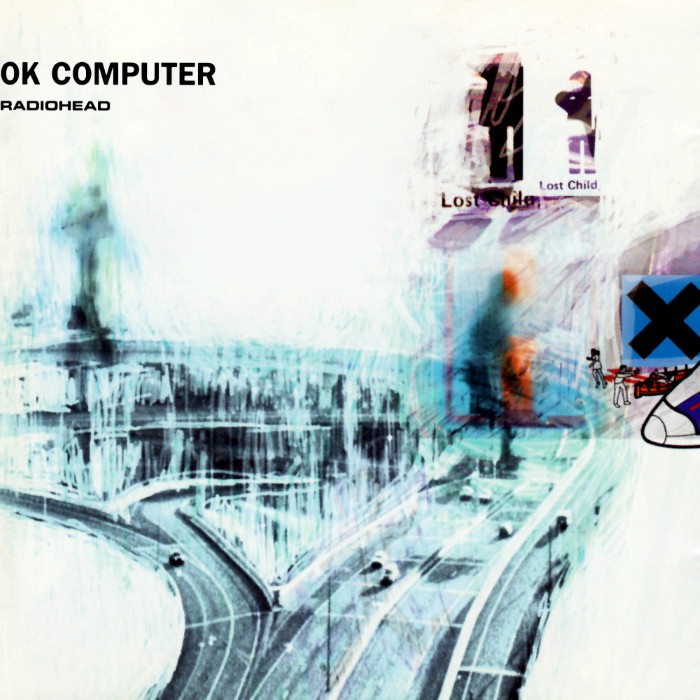OK Computer by Radiohead

OK Computer is the third studio album by the English alternative rock band Radiohead, released on 16 June 1997 on Parlophone in the United Kingdom and 1 July 1997 by Capitol Records in the United States. OK Computer was the first self-produced Radiohead album, with assistance from Nigel Godrich. Radiohead recorded the album in Oxfordshire and Bath between 1996 and early 1997, with most of the recording completed in the historic mansion St. Catherine's Court. The band made a deliberate attempt to distance themselves from the guitar-oriented, lyrically introspective style of their previous album, The Bends. OK Computer's abstract lyrics, densely layered sound and wide range of influences laid the groundwork for Radiohead's later, more experimental work. On delivery to Capitol, label representatives lowered their sales estimates because the album was deemed uncommercial. Nevertheless, OK Computer reached number one on the UK Albums Chart and became Radiohead's highest album entry on the American charts at the time, debuting at number 21 on the Billboard 200. Three songs from the album-"Paranoid Android", "Karma Police" and "No Surprises"-were released as promotional singles. The album built on the band's worldwide popularity and has to date sold over 4.5 million copies. OK Computer received considerable acclaim upon release. Prominent British and American rock critics predicted the album was epochal and would have far-reaching cultural impact. In subsequent years, the album has been frequently cited by critics as one of the greatest albums ever recorded. OK Computer initiated a shift away from the height of Britpop's popularity to the more melancholic and atmospheric style of alternative rock prevalent in the next decade. Critics and fans often remark on the underlying themes found in the lyrics and artwork, emphasising Radiohead's views on rampant consumerism, social alienation and political malaise; in this capacity, OK Computer is often interpreted as having prescient insight into the mood of the 21st century. An LP reissue in 2008 contributed to a popular revival of vinyl records, and an expanded CD reissue in 2009, apparently released without the band's foreknowledge or permission, brought renewed attention to the album and its legacy.
<b>100 Best Albums</b> Few albums so audacious, innovative and anxious have ever captured the popular imagination like <i>OK Computer</i>, the 1997 Radiohead triumph that not only announced a new frontier of rock exploration, but also articulated budding pre-millennial interest in—and concern over—our technological toys. Here are a dozen songs of terror and oblivion, their singer so alienated by the society spinning around him that he pines to be abducted by aliens so that he may witness “the world as I’d love to see it.” There are car crashes and stolen thoughts, clouds of death and spectres of persecution, malevolent robots and a Macintosh LC II that deadpans the new rules for living. It remains a deeply unsettling song cycle that is also deeply magnetic, its reordering of rock ’n’ roll’s sounds with classical ambition making it one of the form’s most radical and necessary statements. Radiohead had not learned their lessons from “Creep”. After wearing themselves thin promoting their first album, they rode the road even harder for <i>The Bends</i>, playing nearly 200 shows in 1995 alone and prowling the United States in a bus emblazoned with an airbrushed stallion. Thom Yorke crowded spiral-bound notebooks with his unease and expressions of isolation, even as he and his pals moved from one crowded room to another. But Radiohead’s relentless devotion to promotion afforded them complete creative control from a label surprised by their success. They reassembled the dream team that had first worked on <i>The Bends</i>—young engineer turned trusted producer Nigel Godrich and artist Stanley Donwood—and decamped to a palatial estate in the British countryside to wrestle with their worries. Debates about Radiohead’s motivations and intentions have raged since <i>OK Computer</i>’s release: Were Yorke and the band lashing out at the work that was almost killing them, or were they concerned about what technology would do to our humanity? Both roots, however, lead to the same sense of desperate isolation that <i>OK Computer</i> captures so well. The narrator in “Subterranean Homesick Alien” can no longer smell their surroundings, while the survivor in “Karma Police” can no longer think their thoughts in safety. Love is a final act of desperation during “Exit Music (For a Film)”, friendship a cover for raptor-like predation during “Climbing Up the Walls”. The band animates these ideas perfectly, alternately stripping the arrangement until it feels like an icy chill, or adding 16 violins clawing at each other to invoke mental claustrophobia. <i>OK Computer</i> is every lump in your throat, turned into a succession of anthems. For all of its dread, <i>OK Computer</i> is ultimately an act of hope, the expression in a belief that our inexorable path of progress does not have to cost us our goodness. Above the hangman riff of “Lucky”, Yorke pines to be pulled back from this abyss’ edge, to be resurrected in love. “It’s gonna be a glorious day,” he sings, and you have to believe it at least <i>could</i> be true. And if there is a remedy to the dizzying pace of, well, everything, it’s simple enough: “Idiot, slow down,” he sings for the last words of closer “The Tourist”, his falsetto newly resolute. “Slow down.” In the decades since <i>OK Computer</i> made Radiohead rock’s new standard-bearers, its grievances—namely, our accelerating isolation—have only mounted. But the answers and the hope it holds linger still.
